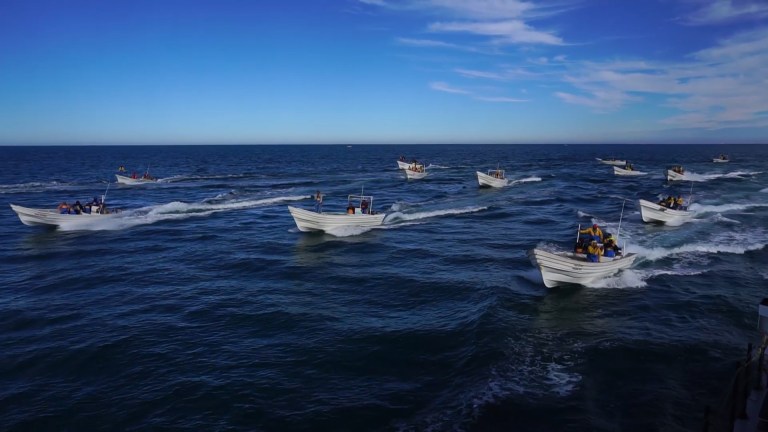Poachers attack Sea Shepherd within vaquita refuge
Marine conservation vessel spotted illegal drift gillnets use in upper reaches of Sea of Cortez.
SEA OF CORTEZ—An attempt to patrol possible illegal fishing activities in the upper stretches of the Sea of Cortez turned into a tense standoff involving poachers, nonprofit marine conservationists and the Mexican Navy, on Jan. 9.
A ship associated with the international nonprofit marine conservation organization Sea Shepherd became entangled with a group of poachers in a vaquita refuge off the eastern coast of Baja California. The entanglement, which culminated with the poachers attempting to board the Sea Shepherd vessel and threatening to use Molotov cocktails, ended when aircraft associated with the Mexican Navy arrived on the scene.
The incident started during the morning of Jan. 9, when the Sea Shepherd vessel M/V Farley Mowat reportedly recovered three drift gillnets during a maritime patrol within the Sea of Cortez’s vaquita refuge. Drift gillnets have been used to catch totoaba, a highly prized fish found off the Baja California coast.
Catching totoabas via drift gillnet has, however, been cited as the reason why the vaquita porpoise is on the verge of extinction. Vaquitas have been a common bycatch within the local commercial fishing practice of catching totoaba by drift gillnet. Any vaquita caught by a drift gillnet has not been able to survive. There are now fewer than 30 vaquitas remaining in the world and the United States, as a response to the vaquita’s endangered species status, implemented a seafood import ban on any Mexican fisheries using drift gillnets within the Upper Sea of Cortez (or Gulf of California, as it’s also known).
Farley Mowat’s crew, after spotting the three drift gillnets, reportedly witnessed at least 35 skiffs, with poachers aboard, within the vaquita refuge.
The ship, according to Sea Shepherd staff, “approached the skiffs where obvious illegal poaching was taking place, as totoaba fishing gear was detected being loaded into a skiff.”
“At this point, one of the skiffs began circling the Sea Shepherd vessel which was soon joined by the remainder of other skiffs,” Sea Shepherd staff continued in explaining the confrontation between Farley Mowat crew and the poachers.
The circling quickly escalated into an ambush, according to a Sea Shepherd statement on the incident.
“M/V Farley Mowat was ambushed and overwhelmed by more than 35 skiffs, many containing gillnets. The poachers attacked by hurling lead weights, anchors, trash, dead fish and even Tabasco sauce at the vessel and its wheelhouse windows in addition to threatening ship’s crew with Molotov cocktails, spraying gasoline at the ship and pouring gas in the sea around the vessel,” Sea Shepherd staff stated about the incident. “Poachers then dropped an illegal gillnet in front of the bow of the moving Sea Shepherd vessel in an attempt to foul the ship’s propellers. Five agitated poachers illegally boarded the M/V Farley Mowat and looted multiple objects from the vessel’s deck while it was temporarily immobilized.”
Crew aboard Farley Mowat reportedly held the poachers who attempted boarded the ship with an emergency fire hose. The crew was able to keep the poachers off until a helicopter deployed by the Mexican Navy arrived on scene and made several passes over the area.
The alleged poachers reportedly fled the scene at this moment. Farley Mowat’s crew, with the help of the Navy sailors and Gendarmeria (a division of Mexican Federal Police) restarted the ship and navigated to San Felipe.
Sea Shepherd has maintained a presence in the Upper Sea of Cortez/Gulf of California since 2015, when it launched Operation Milagro. The operation was launched specifically to help protect the vaquita from illegal totoaba gillnet fishing.
“The totoaba fish is another endemic endangered species to the Gulf of California and it is poached for the trade of its swim bladder in Asian black markets,” Sea Shepherd staff said in a released statement. “Totoaba bladders are known as ‘aquatic cocaine’ due to their high value. It is believed that a totoaba bladder can be worth up to $100,000.”
More than 780 pieces of illegal fishing gear has been collected in and around the vaquita habitat by Sea Shepherd, the nonprofit’s staff stated.



Ha Ha Ha Hippies Failing Badly
You Reap What You Sow.
M/V Farley Mowat was ambushed and overwhelmed by more than 35 skiffs, many containing gillnets. The poachers attacked by hurling lead weights, anchors, trash, dead fish and even Tabasco sauce at the vessel and its wheelhouse windows in addition to threatening ship’s crew with Molotov cocktails, spraying gasoline at the ship and pouring gas in the sea around the vessel,” Sea Shepherd staff stated about the incident. “Poachers then dropped an illegal gillnet in front of the bow of the moving Sea Shepherd vessel in an attempt to foul the ship’s propellers. Five agitated poachers illegally boarded the M/V Farley Mowat and looted multiple objects from the vessel’s deck while it was temporarily immobilized.”
Sea Shepard is only there to harvest some press coverage the “real ” news is that the 1000’s of sq miles of what was colorado river delta is history and has been for 50-75 years and the marshland were an incredible nursery for an envronoment that no longer exists and likely the conditions that bred the vaquita in the first place , the only thing that we can do now is watch to see what the new conditions will support the best and likely only thing to be done is probably the same thing the Canadians did to the caribou in northern washington southern B.C,Sweep up the stragglers and place them in an environment where they will not be lost until an environment can be found where they will survive , its unfortunate that Greenpeece can’t see that the northern sea of cortez is like the Mediterranean and is nearly dead and is merely involved in a downward spiral of over-fishing in a community where the only local protein comes from the sea